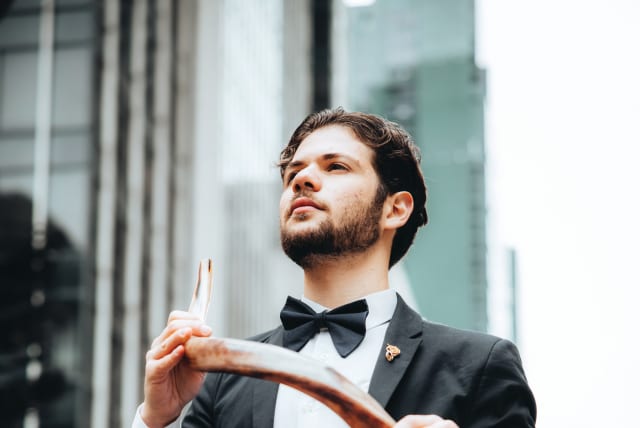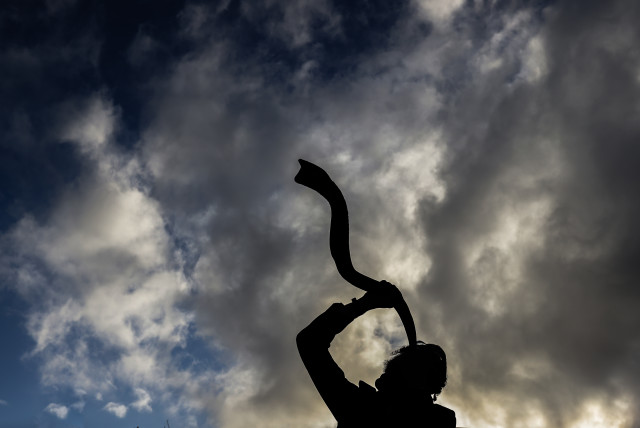Berlin-based Israeli musician Bar Zemach plays shofar in latest performance

While the ram’s horn has popped up in quite a few jazz gigs over the years, there has been precious little seen of the instrument in classical climes.
Jews have been blowing the shofar for millennia. That has predominantly taken place within the context of religious ritual, mostly in the synagogue on Rosh Hashanah, and as the finale to Yom Kippur. And, while the ram’s horn has popped up in quite a few jazz gigs over the years, there has been precious little seen of the instrument in classical climes.
Bar Zemach is looking to address that current low profile presence in his musical neck of the woods. The twentysomething Berlin-based Israeli French horn player has added the shofar to his performance kit and is going about turning it into a bona fide classical orchestral instrument.
Zemach is clearly intent on making his mark on the global classical stage, and is willing to put in the requisite elbow grease to make that happen. Already an established orchestral player and soloist on French horn, a few years ago he added the shofar to his music-making arsenal and is determined to ease its way into the mainstream classical fold.
He paid his dues on his first choice instrument, one of the most difficult to master, before he freed up some of his daytime hours for his new wind instrument. “I really became serious about the French horn around the age of 19-20, when I played in the Berlin Staatsoper (Berlin State Opera) orchestra,” Zemach explains.
That allowed him to get up close to one of the greatest names in the entire classical music domain. “Daniel Barenboim was the conductor. I was there for a year and a half. That’s how I got to know Barenboim.” That also led to another professional port-of-call for the youngster. He joined the West–Eastern Divan Orchestra founded by Barenboim and Palestinian-American academic Edward Said, he said, “and then I auditioned for, and was accepted by, the Dusseldorf Symphony Orchestra. It was quite a long road.”
While he moved deftly along his frontline career path, Zemach always found time for the shofar. “That has always been in the background, since I was 18,” he states. “I didn’t expect things to work out so well with it, but thanks to the people around me and the people with whom I have built up relationships, I have managed to arrive at a stage whereby, next year, I will perform in the premiere of a work for shofar and orchestra. I will be the soloist playing with the Berlin Symphony Orchestra.”
Elevating the unconventional instrument
ELEVATING AN unconventional ethnic instrument to de facto official acceptance of its rightful place in the classical music sector is no mean feat for anyone, not to mention one of its youngest members. “This is a professional event,” Zemach says. “It’s not just playing a few notes. I can play entirely chromatically on it.”
That was a nod in the direction of the odd classical music venture that incorporates the shofar, in a limited melodic role. Jewish American composer Meira Warshauer, for example, has featured the shofar in some of her scores such as Tekeeyah, Concerto for Shofar, Trombone, and Orchestra. But, as Zemach intimates, the sounds the orchestra player made on the shofar were similar to those heard in the synagogue. “I can play completely chromatically on the shofar – that is something new. I can play very softly, all the notes. I practice on it every single day.”
Zemach seems to be taking every opportunity he can to get the shofar out there. He recently played on a tribute to globally venerated 87-year-old klezmer clarinetist Giora Feidman. And there are plans to record a full album of short pieces, written for the shofar.
But, for now, Zemach’s sights are set on a more significant project, which should do much to help cement the place of the shofar as a bona fide member of the Western classical music ambit. He is getting a robust helping hand from a fellow Israeli in the endeavor. “The composer of the concerto for shofar I will be playing with the [Berlin] Philharmonic [Orchestra] is Amir Shpilman.” When we spoke, Zemach was about to pop over to New York, where Shpilman resides, for an intensive period of work on the evolving concerto.
ZEMACH GOT himself an early start to his artistic life, suitably beefed up by some hefty genetic baggage. His father Nir earns a crust as principal trumpet player with the Israeli Opera Orchestra, and his mother Tali was a professional flutist before turning to alternative medical practices.
But how come Zemach started out on the French horn, one of the most formidable instruments in the whole classical shebang? “There was this old horn on the wall, and my dad would take it down and let me blow into it,” he recalls. The kid showed promise from the off. “When I was two years old, I could make a half-decent sound with the French horn,” he chuckles.
He also showed promise on vocals and put in a few childhood appearances, at the age of 10, on the Music School young reality TV show. There was some ivory tickling in the initial stages of his musical awakening, too. “I had a very special childhood,” Zemach notes. “There was more piano than French horn to begin with, between the ages of 7 and 13. I played songs with my parents. And I had fun on the TV show – I was a TV celeb,” he laughs. “I really liked singing.” Sounds like a pretty enjoyable entry into the world of music.
French horn matters took a more serious turn when, at the age of 14, Zemach joined the Thelma Yellin High School of the Arts in Givatayim. It all went swimmingly well and the teenager duly won a scholarship from the Sharett Foundation (America-Israel Cultural Foundation), which provides budding artists with financial support.
That was the game changer for the young horn player – that and the company he kept at the high school. “We were all determined to make it on the global classical music stage,” he smiles. “One of my classmates became an international pianist, another played oboe with the best orchestra in Germany. We decided that, after we graduated from the high school, we would become stars.”
That might have been said tongue in cheek but, judging by Zemach’s progress to date, he and the shofar will, no doubt, blaze a trail to the front of the world’s most glittering stages. And, no doubt, other ensembles will soon follow the Berlin Philharmonic’s lead. Stay tuned.
Jerusalem Post Store
`; document.getElementById("linkPremium").innerHTML = cont; var divWithLink = document.getElementById("premium-link"); if (divWithLink !== null && divWithLink !== 'undefined') { divWithLink.style.border = "solid 1px #cb0f3e"; divWithLink.style.textAlign = "center"; divWithLink.style.marginBottom = "15px"; divWithLink.style.marginTop = "15px"; divWithLink.style.width = "100%"; divWithLink.style.backgroundColor = "#122952"; divWithLink.style.color = "#ffffff"; divWithLink.style.lineHeight = "1.5"; } } (function (v, i) { });

